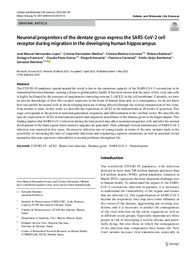Título :
Neuronal progenitors of the dentate gyrus express the SARS‑CoV‑2 cell receptor during migration in the developing human hippocampus |
Autor :
Hernandez‑Lopez, José Manuel
Hernandez‑Medina, Cristina
Medina‑Corvalan, Cristina
Rodenas, Mónica
Almagro, Francisca
Perez‑Garcia, Claudia
Echevarría, Diego
Carratalá, Francisco
Geijo-Barrientos, Emilio
Salvador, Martínez |
Editor :
Springer |
Departamento:
Departamentos de la UMH::Histología y Anatomía |
Fecha de publicación:
2023-05-07 |
URI :
https://hdl.handle.net/11000/34402 |
Resumen :
The COVID-19 pandemic spread around the world is due to the enormous capacity of the SARS-CoV-2 coronavirus to be transmitted between humans, causing a threat to global public health. It has been shown that the entry of this virus into cells is highly facilitated by the presence of angiotensin-converting enzyme 2 (ACE2) in the cell membrane. Currently, we have no precise knowledge of how this receptor expresses in the brain of human fetus and, as a consequence, we do not know how susceptible the neural cells in the developing brain are to being infected through the vertical transmission of this virus, from mother to fetus. In this work, we describe the expression of ACE2 in the human brain at 20 weeks of gestation. This stage corresponds to the period of neuronal generation, migration, and differentiation in the cerebral cortex. We describe the specific expression of ACE2 in neuronal precursors and migratory neuroblasts of the dentate gyrus in the hippocampus. This finding implies that SARS-CoV-2 infection during the fetal period may affect neuronal progenitor cells and alter the normal development of the brain region where memory engrams are generated. Thus, although vertical transmission of SARS-CoV-2 infection was reported in few cases, the massive infection rate of young people in terms of the new variants leads to the possibility of increasing the ratio of congenital infections and originating cognitive alterations, as well as neuronal circuit anomalies that may represent vulnerability to mental problems throughout life.
|
Palabras clave/Materias:
COVID-19 · ACE2
Brain viral infection
Dentate gyrus
SARS-CoV-2
Neurotropism |
Tipo de documento :
info:eu-repo/semantics/article |
Derechos de acceso:
info:eu-repo/semantics/openAccess
Attribution-NonCommercial-NoDerivatives 4.0 Internacional |
DOI :
10.1007/s00018-023-04787-8 |
Publicado en:
Cell Mol Life Sci . 2023 May 7;80(6):140 |
Aparece en las colecciones:
Artículos Histología y Anatomía
|

 La licencia se describe como: Atribución-NonComercial-NoDerivada 4.0 Internacional.
La licencia se describe como: Atribución-NonComercial-NoDerivada 4.0 Internacional.
.png)